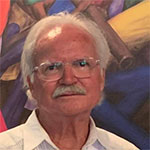The Power of Words and the Power of Desire: Manuel Ulacia’s Origami

When Manuel Ulacia drowned at the age of forty-eight in the Pacific Ocean off the coast of Mexico near Ixtapa-Zihuatenejo in 2001 (pulled out to sea by a riptide), he left behind not only a powerful body of work but also a vacuum in Latin American poetry—his untimely death robbed us of all that he would have written in the future.
 Thanks to Indran Amirthanayagam’s judicious selection and sensitive translation of Ulacia’s poetry, the English-speaking world now has access to this marvelous poetry in Origami: Selected Poems of Manuel Ulacia (Diálogos Books, 2023). The selections are gathered from five of Ulacia’s published books (The River and the Stone, Origami for a Rainy Day, The Blue Plate, Arabian Knights and Scottish Mornings, and First Poems) as well as previously unpublished or uncollected poems.
Thanks to Indran Amirthanayagam’s judicious selection and sensitive translation of Ulacia’s poetry, the English-speaking world now has access to this marvelous poetry in Origami: Selected Poems of Manuel Ulacia (Diálogos Books, 2023). The selections are gathered from five of Ulacia’s published books (The River and the Stone, Origami for a Rainy Day, The Blue Plate, Arabian Knights and Scottish Mornings, and First Poems) as well as previously unpublished or uncollected poems.
The selection contains short poems of his youth of no more than three lines, to longer poems such as Origami for a Rainy Day, which covers twenty-five pages. The poems span the globe from Mexico, Morocco, Tunisia, Great Britain, New York, and elsewhere. Many of Ulacia’s poems are extended epic narratives of an erotic gay adventure traveler.
Published in a handsome bilingual edition with an exquisite cover illustration by the poet’s sister, Isabel Ulacia, this selection brings this important poet’s work not only to those interested in Latin American poetry but to anyone with an appreciation for outstanding literature.
Manuel Ulacia was born in Mexico City in 1953, grandson of Manuel Altolaguire and Concha Mendez, who were members of the “Generation of 27” in Spain from which they were exiled as a result of the Spanish Civil War. After leaving Spain, they lived first in Cuba and later in Mexico. Manuel received a doctorate in Hispanic literature at Yale, where he specialized in Luis Cernuda and later taught at the Universidad National Autonoma de México.
Many of the poems deal with fleeting erotic love. “Hampstead Heath” ends:
Today you remember neither his name nor face.
Perhaps the only trace left imprinted by time
is the smell of tobacco and eau-de-cologne,
which for 15 years has stayed with you
through all the cities, and is now in none.
Even the forces of nature elicit a yearning response for the touch of another human.
The wind is blowing
incessantly everywhere.
Something in me stirs.
Perhaps it’s you, who arrives
suddenly, from far away.
Origami for a Rainy Day is a book-length poem addressed to an anonymous “you,” but in many ways it is an homage to the Spanish poet Luis Cernuda, who was born in Seville, Spain, in 1902. Cernuda—who was Manuel Ulacia’s godfather—was also a member of Spain’s Generation of 27, which included Federico García Lorca, Rafael Alberti, Vicente Alexander, and Ulacia’s grandfather, Manuel Altolaguire. Cernuda fled Spain during the Spanish Civil War and, after living in both England and the United States, ended up in México, living for the rest of his life with the Ulacia/Altolaguire family in México City’s Coyoacán neighborhood.
Suddenly time ceases.
You are as before and another:
the imperceptible visitor
who arrives from now
at the room in the past where you meet
Luis Cernuda. Blue shirt, tweeds,
an umbrella under his arm,
he gazes at you in the tender
strength of your seven years,
guessing at the pearl that time
would have formed in your shadow.
The imagery of these poems is lyrical and evocative; the beauty of the language at times breathtaking in both Spanish and the English translation.
They loved each other. You have
to know this. When the light of their pupils
met, reality
became a feast.
The world turned transparent
and in its transparency their bodies
became one, without touching.
The consistent theme of much of the poetry is a longing, almost a hunger, for love. The speaker of the poem roams the globe in search of this unfulfilled connection.
You search for a complete being
who would be for you
an unknown cipher, but you sleep
with only backs that melt
when they feel the fire of your hands
and then harden in bronze
when the pleasure ends.
Origami brings this important poet’s work not only to those interested in Latin American poetry but to anyone with an appreciation for outstanding literature.
Amirthanayagam has done a remarkable service to literature by compiling and translating this momentous work. That work has taken over twenty years to come to fruition. That fruit is sheathed in these 252 pages, which expands Ulacia’s readership to a much wider audience. It is a memorial to a poet who died tragically and much too young; a testament to the power of words and the power of desire. The translator himself writes an epilogue in verse ending with these lines:
. . . and now more than twenty years
after that robbery on the high seas
comes the fruit, the testament,
your poems, Manolo, born again.
Thank you, Manuel Ulacia, for your wonderful poems and thank you, Indran Amirthanayagam, for bringing them to a wider audience.
Mérida, Yucatán, México















